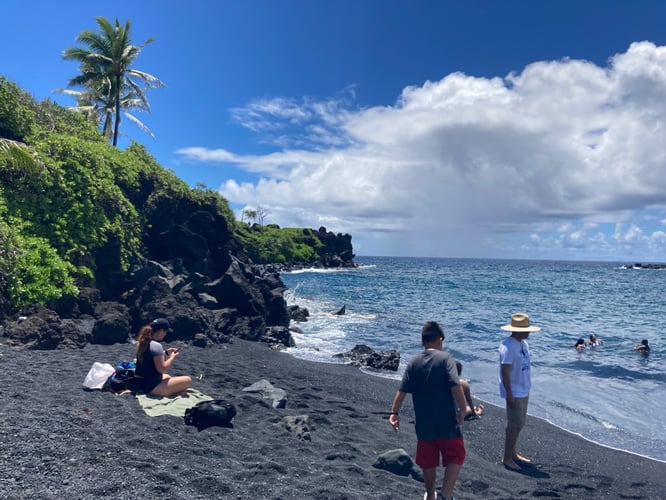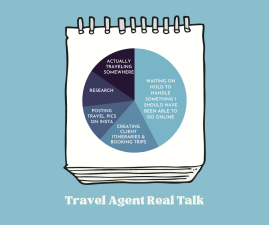How I Make Money as a Travel Agent
One of the most frequently asked questions I get as a travel agent is “how do you make any money?”
Let’s start by establishing that I am, in fact, running a real business! Although I truly enjoy researching and creating trips for people, it’s probably not something I would do completely for free. I spend time to work with my clients, find the right supplier, and put together the details of a trip – and time is the one commodity we can never get back. There are also costs associated with running a business. Licensing, accreditation, software, and so on can really add up. I spend additional time working on creating efficient workflows, attending training, and keeping up-to-date on news in the industry. And even when I travel with my family, I’m taking notes on items of interest to pass on to clients.
Professionals, like myself, get paid for their services. There are two main ways that travel agents make money: commissions & fees. Let’s dive a little deeper into each.
Commissions
About commissions

I’ll let you in on a little secret: anytime you book a place to stay, vacation package, cruise, car rental, theme park ticket, activity, or transfer, you’re already paying a commission. It’s built right into the price of your vacation. When you book direct, the hotel/cruise line/car rental agency just keeps that money as a little extra profit.
Suppliers – the hotels, cruise lines, car rental companies, etc – are willing to pass that commission on to a travel agent in exchange for us selling their product. Additionally, the suppliers know that travelers who use a travel agent are more likely to report satisfaction with their vacation experience, plus we help get their product in front of thousands of travelers every year. It’s really a no-lose situation for them.
How commission is calculated
Commission comes in the form of a percentage of the total pre-tax cost of certain components of your vacation. The typical commission is somewhere between 10-15%, although there are some suppliers that pay more and some that pay less. Some – like airlines – don’t pay any commission at all (more on this in the next section). The commission is not typically paid for add-ons; things like drink packages or spa treatments on a cruise, for example.
An Example
Let’s say a couple decides to book a 7-night Caribbean cruise. They are celebrating an anniversary, so they decide to really go for it, with a balcony stateroom & the drinks package included, plus a couples massage in the ship’s spa. Their travel agent finds them a discounted rate that even includes a little onboard credit, so their total vacation price is $3357.88. Of that amount, only $1246 of it is actually the commissionable cruise fare; the rest is made up of taxes, port fees, and the add-ons the couple chose. This particular cruise line pays a 13% commission, so the agent earns $161.98 for the booking.

This couple has friends who want to join them on their cruise, but the friends are watching their budget a bit more closely. The friends opt to sail in an oceanview cabin and decide they’ll just pay-as-they-go for drinks and skip the massage. Their travel agent finds them the same discounted rate, and their total vacation price is $1323.88. Of that amount, only $662 of it is commissionable cruise fare, so for this booking, the travel agent earns $86.06.
In both instances, the special rate the agent found was lower than what was available to the general public. The couples spent a bit less than booking on their own – and the agent made a little money in addition.
How Commission is Paid
For most vacations, the commission is only paid AFTER the trip has started. This means there can often be a months-long gap between the time I make a booking and the time that I see any financial result. It also means that if you cancel your trip, I generally lose the commission. In that instance, any work I’ve done for a client (researching, preparing an itinerary, etc) has been done for free.
Some suppliers pay very frequently and quickly. One well-known theme park brand processes commission so quickly that I have sometimes received my payment before the client has even returned home from their vacation. Others take weeks or even months to pay after travel. I’m still chasing down payment from a car rental company from a vacation over six months ago! Most often, the commission is paid via direct deposit but some companies still send old-fashioned paper checks in the mail.
My Philosophy on Commission
I recognize that every travel agent has the right to run their business in the way that serves them and their clients best. For me, I have decided that what serves my clients best is to try and find them the best possible trip for their parameters, even if that means losing out on a little commission. In other words, I’m not going to try and upsell someone just so I can earn a higher commission. If I make a recommendation for a more expensive option, it is because I truly believe that it would be worth the additional cost for the client.
I will shop around to check commission levels – sometimes, one vendor will be offering a commission bonus if I book through them. The client pays the same, but I can earn a little extra by going with Company A instead of Company B. I would NOT book a client with a vendor with whom I do not already have a relationship.
Fees
About Fees
Travel agents also earn money by charging service fees. Service fees are an amount of money paid directly to the travel agency for the time, energy and effort expended by a travel agent to coordinate your trip. Fees come in a few different varieties: ticketing fees, planning fees, or “plan-to-go” fees.

Some suppliers (cough cough AIRLINES) do not pay any commission to travel agents. Therefore, many agents may charge a per-person or per-trip ticketing fee to cover the cost of the time and energy it takes to research & book flights.
Sometimes, a client already has the major components of their trip booked. Or, they are choosing to use airline/hotel points to pay for their vacation. If a client is looking for logistical help at this stage, a travel agent may choose to charge a planning fee. If I had a client who wanted to make their own bookings but wanted me to do the research for them, that would be another example of a time that I would charge a planning fee.
Finally, a “plan-to-go” fee is essentially a retainer. The client pays a set amount upfront to the travel agent which is then applied to the trip should the client choose to book. If the client chooses not to move forward with a trip, the agent retains the fee as payment for services rendered to that point.
How fees are calculated & paid
Agents or agencies set the amount of these fees, and costs vary. Ticketing fees range from $25-$150 per person, depending on the type of ticket. Planning fees are either a flat rate or based on the time the agent spends on the trip. I’ve seen these fees as low as $25 or $50 per trip. Fees can be as high as $500 or even $1000 at some agencies. Fees are either added on to your booking as a line item (agent fee, service fee, ticketing fee, etc) or paid upfront as a one-time cost. If an upfront cost, the client typically will pay by credit card, check or even PayPal directly to the agency.
Plan-to-go fees typically sit in the $100-$250 price range. Plan-to-go fees are paid directly to the agency and are separate from any supplier costs. The agency will hang on to the money until after you book your trip. Typically, they’ll pay that money to the vendor at the client’s final payment date. The purpose of a plan-to-go fee is to prevent the agent from doing a bunch of work for a client just to have the client turn around and book on their own, or cancel a trip after it’s already been reserved.
My Current Philosophy on Fees
I do not currently charge fees to 95% of my clients. For large, complicated trips with multiple components or trips that do not pay commission, I may charge a planning fee of up to $150. I may charge less in some circumstances. It really depends on the complexity of the request, my prior relationship with the client, and the amount of time it will take me to complete the task.

Fees are a really hot topic in the industry right now. In 2020, many travel agents saw their entire commission-based income for the year go up in smoke when travelers canceled trips. The result is that in 2022, more and more agents are charging service fees, planning fees, or plan-to-go fees.
Currently, I am not at a point where I see a need to charge fees to the majority of my clients. If my business model does change, I am committed to retaining current policies for existing clients.
The Bottom Line
Professionals deserve to be paid for their time, energy, resources, and expertise. You’d never expect your hairdresser to cut your hair for free, or a plumber to repair a pipe without charging.
When you book a trip with me, you’re supporting a small business! In exchange, I am providing my knowledge, expertise, and time to make sure that you get the trip of your dreams.
Related
How to be a Confident Traveler, Part 4: When Disaster StrikesSimilar post
Why Should I Use a Travel Agent?In "Travel Agent Stuff"
What Does A Travel Agent ACTUALLY Do?In "travel agent life"



